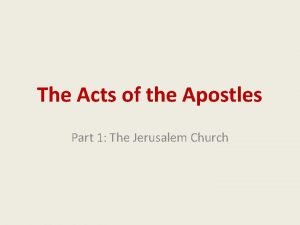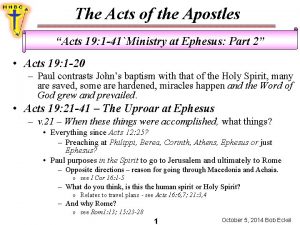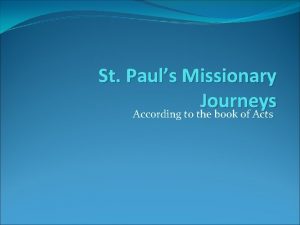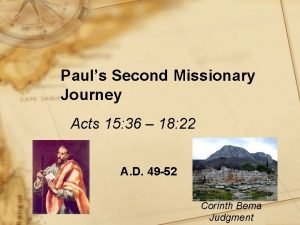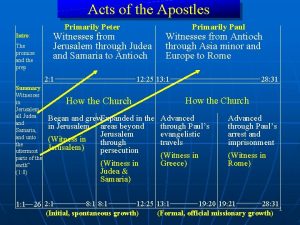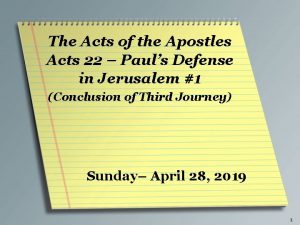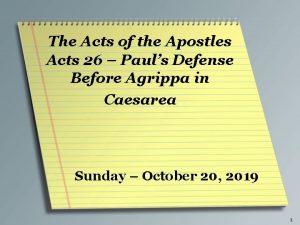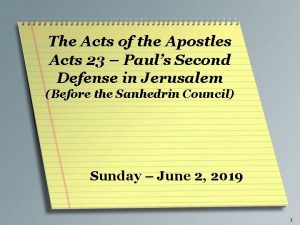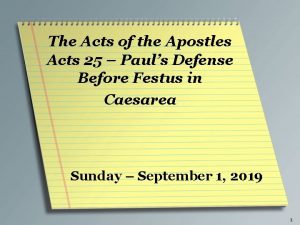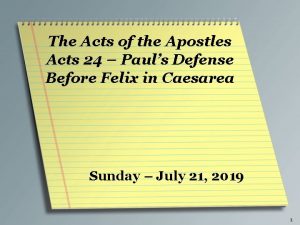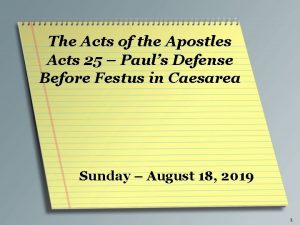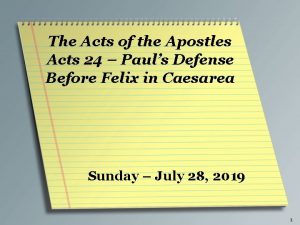The Acts of the Apostles Acts 24 Pauls











- Slides: 11

The Acts of the Apostles Acts 24 – Paul’s Defense Before Felix In Caesarea Sunday – July 7, 2019 1

Paul’s accusers arrive in Caesarea and state their charges against him (24: 1 -9) Tertullus outlines three specific charges against Paul. 1. “mover of insurrections among all the Jews throughout the world” (24: 5). An insurrectionist is one who causes “uprising, riots, revolt, rebellion” (AG 764). � Paul’s history. He either started a church or a riot in every city he visited. ◦ In Thessalonica on the second tour a riot was formed due to his teaching. Acts 17: 6 ◦ At Ephesus, the same thing happened. Acts 19: 28

Paul’s accusers arrive in Caesarea and state their charges against him (24: 1 -9) Tertullus outlines three specific charges against Paul: 2. Paul is accused of being a “ringleader of the sect of the Nazarenes” ◦ Note: Apparently the reason Tertullus brings up this is that he is showing how Paul is preaching an unlicensed religion with the Roman government.

Paul’s accusers arrive in Caesarea and state their charges against him (24: 1 -9) Tertullus outlines three specific charges against Paul: 3. Paul is accused of “profaning the temple” (24: 7). ◦ This was the lie revolving around Trophimus the gentile (21: 28 -29). � NOTE: Tertullus attempts to bias Felix’s disposition about Paul. Tertullus tells Felix that he is confident that he will find these things to be true upon examination and thus guilty. � The other Jews join in with their agreement of the charges made against Paul.

Accounting for the twelve days. 1 — arrival in Jerusalem (21: 7); � Day 2 — meeting with elders (21: 18); � Day 3 — beginning of purification ceremony (21: 26); � Days 3 -9 — seven days of purification (21: 27); � Day 9 — attack in temple and arrest (21: 2722: 29); � Day 10 — Paul before the Sanhedrin (22: 3023: 10); � Day 11 — revealing of plot against Paul; departure to Caesarea; � Day 12 — Arrival in Caesarea (23: 31 -33). � Day

Paul’s third defense. (24: 10 -21) � Paul states that he caused no trouble in the temple as he is so charged. � Paul states that he caused no stirring up of the crowds, synagogues nor in the city itself. � The one thing that Paul did agree with Tertullus was that he was indeed a Christian. ◦ Others called Christianity a “sect of Nazarenes” yet Paul never referred to the church as a sect. He openly admits that he is a member of that which they call a sect and one who serves God (24: 14).

Paul’s third defense. (24: 10 -21) � Paul had the deepest respect for the Mosaic Law because it pointed toward the coming of Christ and a resurrection of the just and unjust (24: 15). � Paul states that he was peacefully in the temple fulfilling a vow and these Jews from Asia came and apprehended him. � If what he did was so bad then where are these men who apprehended and beat him?

Paul’s third defense. (24: 10 -21) � Paul finally challenges the Sanhedrin Council that is present to find one thing he has done contrary to the law (24: 20). � Paul again concedes to the fact that he preached “the resurrection of the dead” and that this alone is the real reason he is called before the Roman governor Felix. � NOTE: The real issue in many cases is often muddied or clouded under the guise of personal flaws. This method often takes the attention away from the real issue. Paul kept the issue in its proper order!

� Acts 17: 32, “Now when they heard of the resurrection of the dead, some mocked; but others said, We will hear thee concerning this yet again. ” � Acts 23: 6, “But when Paul perceived that the one part were Sadducees and the other Pharisees, he cried out in the council, Brethren, I am a Pharisee, a son of Pharisees: touching the hope and resurrection of the dead I am called in question. ” � Acts 23: 8, “For the Sadducees say that there is no resurrection, neither angel, nor spirit; but the Pharisees confess both. ”

� Acts 24: 14 -15, “But this I confess unto thee, that after the Way which they call a sect, so serve I the God of our fathers, believing all things which are according to the law, and which are written in the prophets; having hope toward God, which these also themselves look for, that there shall be a resurrection both of the just and unjust. ” � Acts 24: 20 -21, “Or else let these men themselves say what wrongdoing they found when I stood before the council, except it be for this one voice, that I cried standing among them, Touching the resurrection of the dead I am called in question before you this day. ” � Acts 26: 22 -23, “Having therefore obtained the help that is from God, I stand unto this day testifying both to small and great, saying nothing but what the prophets and Moses did say should come; how that the Christ must suffer, (and) how that he first by the resurrection of the dead should proclaim light both to the people and to the Gentiles. ”

Felix replies to Paul’s defense. (24: 22 -27) � Philip the Evangelist has been preaching in Caesarea for approximately 24 years (AD 34 to AD 58). � Felix was certainly familiar with the teachings of Jesus. � Knowing that Paul was innocent yet fearing the loss of popularity among the Jews, Felix “deferred” Paul’s legal case until Claudius Lysias came to Caesarea with more evidence. � To “defer” a case is to “postpone. ” � No information is given as to whether Claudius Lysias ever came to Caesarea with additional testimony.




